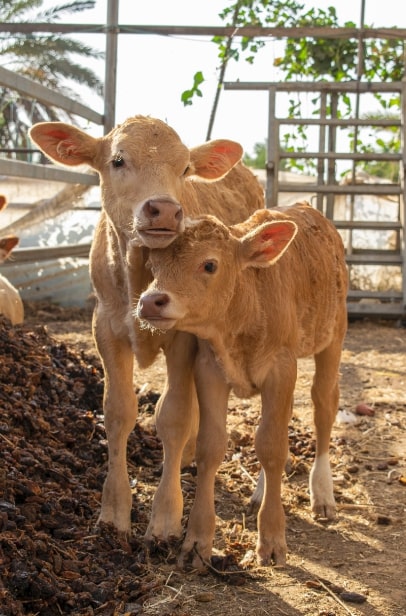All livestock farmers should keep in mind that their profits closely link to animal health. When there are more healthy animals, there’s higher productivity and profit. This is crucial to understand. Although, urgent daily tasks like managing farm accounts and doing repairs can take up a lot of time. As a result, some farmers spend little time thinking about how to improve conditions for animals. We’re going to help by discussing a couple of important areas for young cattle here.
Look after the young animals
Firstly, we’ll go over how you can guarantee good health among young cattle. Healthy calves are the future of your business and farm. Thus, managing newborns for their first hundred days is critical. It calls for special attention.
With colostrum, it’s the first milk generated by the cow after giving birth. It holds antibodies and other things that work to boost calf immunity. You need to encourage the calf to take in as much colostrum as it can in the first couple of days following birth. Sucking works better than feeding via buckets since it enables superior mother-calf bonding.
Then there’s milk feeding. Following colostrum, the cow will begin producing standard milk. A calf needs to get milk equal to 10% of its body weight every day. This will allow it to obtain a daily weight gain of around 500 grams. Let’s assume that the calf weighs 50 kilos at birth. They should get 5 litres of milk daily at minimum. You could divide this into two or three portions.
Restrict water intake
Next, you’ll want to restrict water intake. As opposed to adult cows, calves can’t restrict the water they consume. You’ll need to do this for them to maintain good animal health. Depending on the weather, offer one to two litres of water each day for the calf to drink. Should a calf over-drink, it can cause red urine.
Other resources
It’s also possible to add energy-rich calf pellets to the milk from about the third week. Initially, you should only add a few spoons of them. Afterwards, gradually up quantities to the recommended amount. This will aid you in preventing digestion trouble.
Something else you should pay attention to is salt licks. A cow’s milk will hold some minerals. Yet, it might not be enough for a quickly growing calf. Salt lick blocks are useful for addressing the deficit.
Tick and worm control
When your calves begin grazing with other cows, they can get ticks and worms. It’s necessary to control them. You may need worming every three months, but always get input from a vet to reduce the risk of issues. Perform routine tick control measures as well. If you can, think about letting the calves graze separately.
Lastly, there is the social aspect. A calf should be permitted the company of other cows and calves. This is how they’ll learn to sleep, run, and play together. Additionally, it will aid your animals in eating well and becoming active. If you’ve seen cows and calves licking each other, it’s them providing skincare. Furthermore, it develops social bonds between them. These are equally important to overall animal health.
Diseases to watch out for
The second important area we need to look at is the specific diseases your animals can encounter. One is bovine viral diarrhoea virus (BVDV). Animals suffer from this when they encounter the bodily secretions of other infected creatures. Thus, you must isolate animals that have it. Blood tests can dictate whether an individual animal is infected. Also, a bulk milk ELISA test can gauge the milking herd’s immunity.
Another issue is Bovine Johne’s Disease (BJD). Symptoms here include weight loss, lower milk production, diarrhoea, and death eventually. Animals become infected by ingesting contaminated faeces. Reliably detecting infection in live animals is tricky. This is particularly true in the disease’s early stages. You can manage the spread by isolating young calves. Another solution is culling infected animals to lower the shedding of Mycobacterium paratuberculosis in the area.
The final disease on our list is Q fever. Animals become infected by ingesting the milk, faeces, or urine of an infected animal. It’s the same with placental fluids. The disease is one of the most dangerous for cattle, potentially causing stillbirths, weak newborns, and infertility. All farmers should be very careful to monitor for it.
We have reliable products to improve animal health
At JS Hubbuck Ltd, we have a great selection of products available to improve the health and wellbeing of animals. With them, it’ll be easier to keep on top of everything. You’ll find our merchandise to be reliable and reasonably priced.
So, if there’s something we can do for you to help improve animal health, please let us know. We deliver a great service for every single customer.

